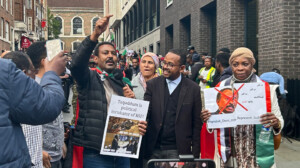Sudan: 29 security officers sentenced to death
A Sudanese court has sentenced 29 National Intelligence and Security Service (NISS) officers to death for the torture and killing of a teacher during the revolution.
 (File photo)
(File photo)
A Sudanese court has sentenced 29 officers of the National Intelligence and Security Service (NISS) to death for the torture and killing of a teacher during the revolution.
On Monday, the Omdurman Criminal Court sentenced 29 officers of the NISS to death by hanging for the killing of teacher Ahmed El Kheir in Kassala in early February.
The trial began at 10 am on Monday under strict security measures. Judge El Sadig Abdelrahman stated that it was proven that teacher Ahmed El Kheir died in Khashm El Girba in Kassala on February 2 after he was tortured in detention. He was held by security agents after he took part in an anti-government protest on January 31.
The 29 perpetrators were convicted under article 21 (criminal participation) and article 130 (intentional homicide) of the Sudanese Criminal Law. Two other officers were sentenced to imprisonment for a period of three years. Seven others were acquitted.
The trial against the defendants began in Omdurman on August 21. During the second session, a week later, the police used tear gas in an attempt to disperse the hundreds of activists, teachers, and relatives of people killed during the uprising who gathered near the Omdurman court.
'Milestone'
The defence lawyer Adil Abdelghani told reporters after the announcemnet of the verdict that he considers the case “a milestone in the history of the Sudanese judiciary system. The verdict represents a turning point in the judicial or security institutions that had been covering up crimes of the NISS officers,” he said.
He explained that it was the first case in which members of the security apparatus have been tried for a murder case. It is also the first case in which such a large number of perpetrators have been sentenced.
In a press conference after the verdict, Attorney General Tajelsir El Hibir described the killing of the teacher as “a heinous crime” that “shook the human conscience”, and expressed his satisfaction with the decision of the court.
The Attorney General stated that the court case was built on clear legal grounds. He further urged the Sudanese government to ratify the Convention against Torture and Other Cruel, Inhuman or Degrading Treatment or Punishment.
The spokesman for Sudan’s Sovereign Council Mohamed El Faki commented that the results of the trial will strengthen the confidence of the Sudanese people in their justice institutions. “Justice is one of the demands of the revolution, and to achieve it must be the duty of everyone in any institution,” he said.
The Sudanese Professionals Association responded in a statement by saying that “the torture and killing of Ahmed El Kheir shook every Sudanese conscience, and removed the last splinters of doubt about the evilness of the security services of the deposed regime”. He is perceived as a hero for the Sudanese people and his death has paved the way for justice in the entire country, the statement added.
Retribution
The relatives of the victim said they wanted retribution when the court asked them if they preferred amnesty or retribution. The brother of the victim commented that the ruling does not only represent a victory for the family, but rather a victory for justice for all Sudanese, and for the revolution.
Thousands of demonstrators from the capital and the other states gathered in front of the court for the support of the victim’s family. They chanted slogans like “Long live justice”, and “We do not accept money for justice (amnesty)”.
Radio Dabanga’s editorial independence means that we can continue to provide factual updates about political developments to Sudanese and international actors, educate people about how to avoid outbreaks of infectious diseases, and provide a window to the world for those in all corners of Sudan. Support Radio Dabanga for as little as €2.50, the equivalent of a cup of coffee.












 and then
and then